7 Best Business Credit Cards for Real Estate Investors Compared

Real Estate Bees’ editorial team asked a number of industry-leading real estate investors to share their expertise on the best business credit cards for real estate investing to help our readers make a more informed decision when choosing a credit card for their needs.

With the help of the experts, we identified the best business credit cards for real estate investing business and evaluated them based on critical factors that are important for real estate investors. We never receive any compensation for the inclusion of products or services in our articles. Read our editorial guidelines to learn more about our review and rating process.
In the course of this article, we are going to discuss the best options out there for real estate investors who want to get a great deal on their credit card payments.
Read on to find out about the best business credit cards for real estate investors so you can get your hands on the best out there!
| Best Card Options | Intro APR | Welcome Offer | Regular APR | Annual Fee | Credit Score Needed |
| The Business Platinum Card® from American Express | 0% | Upon spending $15,000 on eligible purchases within the first 3 months, you can earn 120,000 Membership Rewards® points | 14.99% – 22.99% | $695.00 | 670 – 850 |
| Lowe’s Advantage Card | 0% | 20% off, up to $100 on your first purchase using the Lowe’s Advantage Card | 26.99% | $0.00 | 670 – 850 |
| U.S. Bank Cash+ Visa Signature Card | 0% | Upon spending $1,000 in the first 4 months, you can get $200 cashback | 14.74% – 24.74% | $0.00 | 670 – 850 |
| U.S. Bank Business Triple Cash Rewards World Elite™ Mastercard® | 0% | $500 cashback reward upon spending $4,500 within the first 150 days | 14.24% – 23.24% | $0.00 | 670 – 850 |
| Ink Business Preferred® Credit Card | 0% | You can earn 100,000 bonus points upon an expenditure of $15,000 in the first 3 months on select purchase | 16.24% – 21.24% | $95.00 | 670 – 850 |
| Capital One Spark Miles for Business | N/A | You can earn 50,000 bonus miles upon spending $4,500 within the first 3 months | 20.99% | $95.00 | 670 – 850 |
| Ink Business Unlimited® Credit Card | 0% | You can earn $750 cashback rewards upon spending $7,500 within the first 3 months of account opening | 13.49% – 19.49% | $0.00 | 670 – 850 |
The Business Platinum Card® from American Express
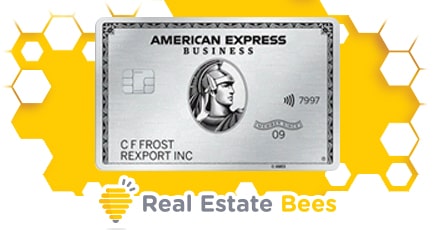
Overview
| Pros | Cons |
|
|
If you are a real estate investor who has to travel very frequently (because, it’s business, of course), then the Business Platinum Card by American Express is made just for you.
This card offers you all the benefits of traveling from luxury travel perks to elite lounge access to airline incidental credit.
The Amex Business Platinum Card offers up to $200 annual airline fee credit.
However, this credit can only be exhausted on airline incidentals such as checked bags and inflight refreshments.
As a new member of the Amex Business Platinum Cardholders team, you also get $120,000 Membership Rewards points upon spending $15,000 on eligible purchases with your card within the first three months of being enrolled in the Rewards Membership.
Talking about rewards, you can also get 5X Membership Rewards points on flights and prepaid hotels when you are using amextravel.com to book your flights or hotels.
Amex also offers you 1X points for each dollar you spend on select and eligible purchases.
You also get the long-time perks of having the Amex Business Platinum card, apart from offering $200 annual credit for airline incidentals, this real estate investor credit card also gives you airport lounge access.
As the best credit card for real estate investors and small businesses, this card can give you the privilege to enjoy expedited security along with cost-saving because you will receive a fee reimbursement for a TSA pre-check or a Global Entry fee that is charged on your Amex card.
You get an $85 fee credit every 4.5 years for TSA PreCheck and $100 fee credit every 4 years for Global Entry.
It has ties with 2 major hotel chains which are Marriot and Hilton. When it comes to Marriott, you can receive a 25% points bonus on your stays as well as a room upgrade.
The room upgrade is, however, subject to availability. On the other hand, the Hilton Honors Gold Status allows you to enjoy 2 bottles of water per day, late checkout, and free breakfast daily.
Keep in mind that you must be enrolled in the benefits program through your Amex account to derive benefits of Hotel Elite Status from these two major hotel chains.
Other benefits of this real estate investor credit card include up to $400 annual Dell shopping statement credit and up to $360 annual Indeed statement credit.
You also get up to $150 annual Adobe statement credit and up to $120 annual wireless phone services statement credit.
This real estate investor credit card also includes other travel perks such as trip delay insurance, trip cancellation and interruption insurance, baggage insurance, car rental insurance, rental elite car status, and much more.
The non-travel perks include purchase protection and cell phone protection.
How Does It Compare to Other Options on Our List?
As evident as it is, Amex Business Platinum Credit Card has 0% Intro APR like most other real estate investor credit card options on our list, except for Lowe’s Advantage Card.
The regular APR is variable but comparatively a bit higher than most other options on our list.
However, the regular variable APR is lesser in comparison to the Ink Business Preferred Credit Card.
Unlike most other options on our list, the Amex Business Platinum card charges a hefty annual fee (most of the other cards on our list don’t).
In fact, with a $695.00 annual fee, it charges the highest annual fee on our list which is a huge downer.
However, it does make up with the myriad benefits it offers in terms of travel perks which may only be beaten by Capital One Spark Miles For Business (or maybe not).
Expert Insight
What do you like about this credit card?

The Amex Business Platinum Card offers the best perks IF you can meet the spending requirements: 150k points bonus, travel credits, and lounge access. It’s the gold standard for rewards cards.
What do you dislike about this credit card?

The spending requirements for the second year are not realistic for many business owners at $75,000.
This card might be only used for a year and then canceled due to the high spending requirements to keep lounge access. Still, for that first year, it’s worth getting the card and using it.
Lowe's Advantage Card
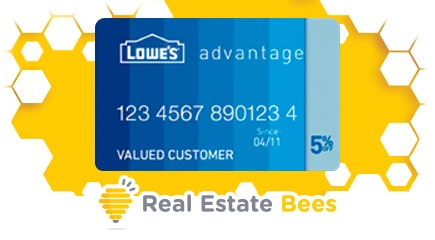
Overview
| Pros | Cons |
|
|
As a new cardholder, Lowe’s Advantage Card gives you the privilege to receive a coupon item for as much as 20% off on your first purchase, up to $100.
When you make a purchase of $2,000 or more, you are eligible for installment financing at an APR of 7.99% for 84 months of installment.
One of the biggest perks of Lowe’s Advantage Card would be that it gets you a 5% discount at Lowe’s on select purchases that are eligible for a discount.
You will find this card to be one of the best business credit cards for different types of real estate investors because the biggest of the rewards are available on home improvement items.
You do not need to wait to collect your points because the discount is taken almost instantly at purchase.
The Lowe’s Advantage Card has a regular APR of 26.99% which is variable depending on the business line of credit.
The one downside to the card is that while you are eligible for special financing for purchases of $299 or above, the whole offer is based on deferred financing.
This means that your interest is still being calculated on the purchase, and if you do not pay it completely by the end of the promotion period, huge interest rates could be levied on you.
How Does It Compare to Other Options on Our List?
The Lowe’s Advantage Card is the only card on our list of the best business credit cards for real estate investors that does not have an intro APR.
Like most other cards on our list, it has zero annual fee and 20% off up to $100 on your first purchase. This card follows a cashback reward structure, unlike many of the other cards on the list.
U.S. Bank Cash+ Visa Signature Card
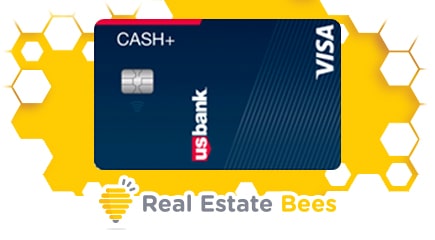
Overview
| Pros | Cons |
|
|
U.S. Bank Cash+ Visa Signature Card is one of the best business credit cards for real estate investors who wish to move their expenses to another card.
It allows you to avoid paying absurdly high interest rates as imposed by most other real estate credit card options out there.
The Rewards Rate is comparatively high which is a huge perk for real estate investors looking to get their hands on some of the most lucrative rewards. It comes with only the best credit card options.
As a sign-up bonus, you get $200 while having to incur no annual fee. There is 0% intro APR on all purchases and balance transfers, as well as the line of credit.
As a welcome offer, U.S. Bank Cash+ Visa Signature Card offers 5% cashback on two categories and up to $2,000 quarterly.
If booked in the Rewards Travel Center, you can also get 5% cashback on prepaid air, hotel, and car reservations.
This kind of reward structure can be of great help if you are a real estate investor because you can earn great cashback on such product categories as electronics and furnishing.
As a real estate investor, it is obvious that you may have to renovate properties every now and then and set them up for rental.
This would require you to buy furniture and electronics frequently. With the U.S. Bank Cash+ Visa Signature Program, you can save more, which also makes it one of the best credit cards for house flippers.
Moreover, this real estate investor credit card has no annual fee which is a common perk any real estate investor should look for to dodge one of the easily avoidable additional costs that come with credit cards.
How Does It Compare to Other Options on Our List?
The U.S. Bank Cash+ Visa Signature Card has a regular variable APR of 14.74% to 24.74% which aligns with most other options on our list.
The regular APR is comparatively lower than Wells Fargo Active Cash® Card and Ink Business Preferred® Credit Card on our list.
Like most other options on our list of the best credit cards for real estate investors, this real estate investor card has zero annual fees and 0% intro APR.
U.S. Bank Business Triple Cash Rewards World Elite™ Mastercard®
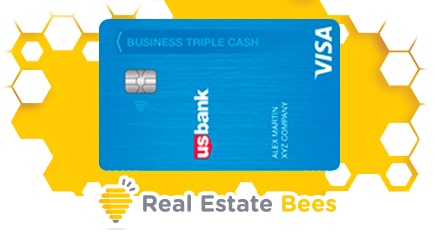
Overview
| Pros | Cons |
|
|
If you are a savvy real estate investor who is mostly always on the go, with a lot of travel on your agenda, this card is probably your go-to option.
As one of the best business credit cards for real estate investors, U.S. Bank Business Triple Cash Rewards World Elite™ Mastercard offers trip insurance if your trip is canceled, cut short, or interrupted by conditions such as illness or bad weather.
If you have a prepaid non-refundable expense such as hotel reservations, tickets, or tours, you can get a reimbursement for those expenses.
The best part about this real estate investor credit card is that the rewards never expire and you can earn unlimited cashback.
Moreover, you can get 3% cashback on spending on gas stations, phone supplies, etc.
As a welcome bonus, you can get a $500 cashback on $4,500 spent from the card within the first 150 days.
How Does It Compare to Other Options on Our List?
There are a few downsides such as a balance transfer fee of 3% and a 3% foreign transfer fee.
If you are a real estate investor who often has to travel outside the country, the foreign transaction fee may make this card look like not the best credit card for real estate investors.
However the other benefits and charges are pretty standard in comparison to many other card issuers, making it worth a shot.
Ink Business Preferred® Credit Card
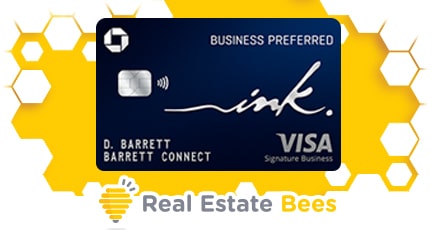
Overview
| Pros | Cons |
|
|
Like the Ink Business Unlimited Credit Card, the Ink Business Preferred Credit Card offers free employee cards to owners of businesses that work as organizations.
Therefore, if you are a real estate investor with employees working with you, this could be the best real investor credit card for you.
Since the card has an annual fee of $95, it is worth adding employees to the card which will make the annual fee justified.
However, at the end of the day, you will be responsible for the expenditure they make on the card, therefore it is advisable to only add trusted employees.
The card also offers extended warranty protection on select purchases that do have a standard warranty of three years or less. With this card, you can get an extended warranty of one additional year.
The card also offers cell phone protection, purchase protection, and car rental insurance amongst other benefits.
Another significant highlight of this card is that there is no foreign transaction fee and the interest rates for the business line of credit vary from 16.24% to 21.24%.
One downside to Ink Business Preferred Card is that there is a penalty APR of up to 29.99% on the business line of credit and a late fee of $39.00.
Another downside of the card is that it has an annual fee of $95.
However, if you want a card with flexible point redemption options, then this is one of the best cards for real estate investors.
How Does It Compare to Other Options on Our List?
The Ink Business Preferred Card is one of the two cards on our list that charge an annual fee.
The other real estate credit card option that charges an annual fee is Amex Business Platinum Card.
However, compared to Amex, this real estate investor credit card charges a comparatively lower fee ($95.00 in comparison to $695 for Amex).
Like most other cards, it has 0% Intro APR for the business line of credit, and it is one of the few options that have a $0 foreign transaction fee.
The regular APR (16.24% – 21.24%), however, is comparatively higher than most other cards on our list such as Ink Business Unlimited Credit Card, Wells Fargo Business Platinum Credit card, etc.
Expert Insight
What do you like about this credit card?

The Chase Ink Business Preferred helps my business rack up huge points for our everyday purchases.
For example, we earn 3 times the points for every $1 spent on advertising on social media sites and search engines.
These points have allowed us to pay for company retreats, including hotel and travel, directly from the rewards we’ve earned.
What do you dislike about this credit card?

What I don’t like about the Cash Ink Business Preferred is that there is an annual fee, monthly ACH fees, and historically poor customer service from our Chase banking contacts.
Capital One Spark Miles for Business

Overview
| Pros | Cons |
|
|
Sometimes, our businesses turn us into road warriors.
If you are not saving up on travel, if you look at your bills at the end of the quarter, you would be disappointed at how much you have spent on airlines, tickets, hotels, and everything else that requires you to bear expenses when you are away from home.
Thus, all in all, this Capital One Spark Miles for Business credit card is a great option if you are a real estate investor who travels often enough to derive the numerous travel benefits provided by the card.
It is also a great option if you want luxury perks like hotel elite status, airport lounge access, and rental elite status.
How Does It Compare to Other Options on Our List?
Unlike most other cards on our list, Capital One Spark Miles for Business has an annual fee of $95 and a comparatively high APR of 20.99%.
Unlike the other cards on our list, it also does not have an intro APR which means the regular APR applies since the beginning for the business line of credit.
However, it offers a plethora of travel loyalty programs that can be of great use if you are a frequent traveler.
Ink Business Unlimited® Credit Card
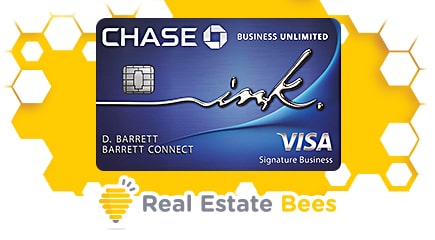
Overview
| Pros | Cons |
|
|
If you are looking for a real estate investor credit card not just for yourself but also your employees, the Ink Business Unlimited Credit Card would make a great option for you.
You can get free employee cards as a cardholder with this real estate investor credit card.
Ink Business Unlimited allows you to add your employees as cardholders for absolutely zero additional fees. On top of that, you are eligible to earn 1.5% cashback on all of their purchases.
Although the Ink Business Unlimited credit card does not offer many travel perks, it does offer rental car insurance.
Apart from this, you also get purchase protection which covers your new purchases for 4 months against damage and theft.
The insurance allows you to claim up to $10,000 per claim and $50,000 per account.
Ink Business Unlimited credit card also offers extended warranty coverage which can help you protect your property and get an extended warranty of an additional year if the standard warranty offered by the product is of 3 years or less.
The simplicity of this card makes it a great option for those who are looking for a simple reward structure and process.
The most significant highlight of the card is that, regardless of any category, you can get 1.5% cashback on all purchases.
Most importantly, there are no caps or annual fees that can put a dent into your pocket.
Although most small business credit cards are limited to business owners, if you are a real estate investor with a business that operates online-only, you are still eligible for the Ink Business Unlimited card.
How Does It Compare to Other Options on Our List?
It is one of the simplest cards on our list, unlike others that may pose one too many terms and conditions on your credit.
There is no intro APR like most other options on our list and the regular variable APR is comparatively lower than many credit cards on our list of the best credit card options for real estate investors.
It has no annual fee as well. However, it does not offer many travel benefits like the Amex Business Platinum Card as well as the U.S. Bank Business Triple Cash Rewards World Elite, or even the Capital One Spark Miles for Business card.
The good thing is that it has no annual fee, unlike Amex Business Platinum Card and the Ink Business Preferred Credit Card.
Expert Insight
The Ink Business Unlimited® Credit Card is a good choice for house flip financing.
What do you like about this credit card?

Chase provides a larger credit line than other banks which allows me more flexibility for rehab projects.
What do you dislike about this credit card?

I’d prefer more points but that’s always the case.
How We Chose the Best Credit Cards For Real Estate Investors
To choose the best credit card, as a real estate investor, you need to consider several factors.
One of the most important ones is that you should have enough cash on hand to cover any unexpected expenses and emergencies.
Also, if you are planning to buy a property or invest in real estate, you will need good financing options.
You can get the best deals from banks and other financial institutions by using your credit card.
However, it is also true that there are some drawbacks associated with using credit cards. Here are some of them.
Interest Rate
The first one is the interest rate. If you use your credit card to pay for things like rent, utilities, home improvement projects, etc., then you may end up paying more than what you would have paid had you used cash.
This happens because when you use your credit card, the bank charges you an additional amount of money every month to cover the cost of the services you bought.
In addition, these fees add up over time and they can be pretty high. Therefore, if you want to avoid this problem, you should only use your credit card for small purchases.
0% Intro APR
One advantage of using a credit card is that you don’t have to worry about paying a lot of interest.
When you apply for a mortgage loan, you usually have to pay a higher interest rate if you don’t qualify for a lower one.
But with a credit card you won’t have to pay any interest at all for six months. After that period ends, you might start paying a certain percentage of your balance each month.
But if you make sure to keep your balance low, then you shouldn’t have to deal with this issue too much.
No Annual Fee
We prioritized those credit card options which do not charge annual fees. These fees are charged regardless of how many times you use your card.
They are usually around $100 per year. It is possible that you might find yourself having to pay these fees even though you didn’t use your card very often.
Moreover, these fees can mount up quickly and increase your overall debt. So, if you want to save money, you should try to avoid using credit cards with annual fees.
Rewards
We preferred those credit card options that had great reward programs. Reward programs ensure that you earn extra benefits whenever you use your credit card.
You can redeem these points for gift cards, travel packages, merchandise, cashback, and other valuable items.
The rewards program is one of the biggest reasons why we chose the Amex Platinum card. We found out that it has one of the best rewards programs among its competitors.
Credit Score
Another factor that you should look into before choosing a credit card option is your credit score.
A credit score is a number that shows lenders whether you are likely to repay your debts.
As a real estate investor, it is essential that you know your credit score so that you can take appropriate action if needed.
For example, you could ask your lender to raise your limit or give you a better interest rate if your credit score is below 620.
On the other hand, you could request a different type of credit card if your credit score is above 700.
Repayment Terms
The last thing we considered was the average length of the repayment term. Credit card companies offer various terms depending on your needs.
Some people prefer short-term loans while others need long-term ones. The longer the repayment term, the bigger the monthly payments will be.
However, there are some advantages to making large payments. First, you get to enjoy the convenience of automatic billing.
Second, you also get to avoid late fees and penalties. Lastly, you can reduce the total amount of interest you pay by making larger payments.
Welcome Bonus
A welcome bonus is an additional benefit offered by most credit card providers. This is generally given as a form of compensation for new customers.
Most of them have no strings attached. You don’t have to use the welcome bonus in order to qualify for the rest of the features of the credit card.
But you still get to enjoy the benefits when you sign up for the card.
We prioritized those cards that come with a 100% match bonus. These bonuses are usually good enough to cover any expenses you incur during the first few months of using the card.
The Best Credit Card For Real Estate Investors – Conclusion
In summary, there are many factors that you should consider before signing up for a credit card. It is important to choose the right card based on your current financial situation.
If you want to maximize your chances of getting approved for a loan, then you should apply for a secured credit card.
In addition, you must make sure that the card comes with a low APR. This way, you will save money on interest rates.
Finally, you should check the rewards program of the credit card company. Make sure that you select a card that offers the highest rewards possible.
We hope that our thoughtfully written guide helped you decide which credit card is the best for real estate investors.
Additionally, you may want to read our review and comparison of the best banks for real estate investors to open an account at.
Don’t forget about the importance of properly keeping the records of your business expenses. Here is our list of the best real estate investor accounting software products.
Feel free to share this article with anyone who might find it useful. Thanks for reading!
Survey of Experts: Which credit card do you use for your investing business?
__
About the Author:
With over 20+ years of experience in real estate investment and renovation, Brian Robbins brings extensive knowledge and innovative solutions to the HouseCashin team. Over the years Brian has been involved in over 300 transactions of income producing properties across the US. Along with his passion for real estate, Brian brings with him a deep understanding of real estate risks and financing.
